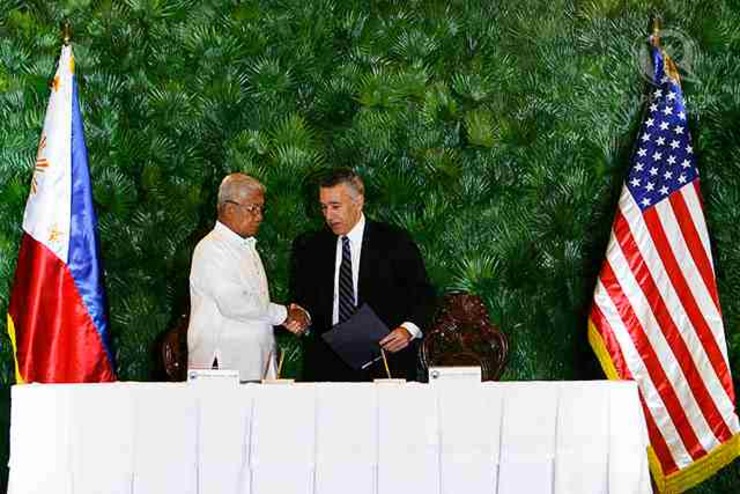The Office of the Solicitor General's comment is filed a few days before the scheduled meeting between Philippine military chief General Gregorio Catapang Jr and US Pacific Command chief Admiral Samuel Locklear III

EDCA SIGNING. File
photo of Philippine defense Secretary Voltaire Gazmin and US
The Office of the Solicitor General (OSG) filed before the Supreme Court (SC) on Friday, October 10, a consolidated comment seeking to dismiss for "lack of merit" several petitions filed against the constitutionality of the Enhanced Defense Cooperation Agreement (EDCA).
The new deal expanding cooperation activities between the Philippine and US militaries is necessary to defend the West Philippine Sea (South China Sea), argued the petition led by Solicitor General Florin Hilbay.
It asked the High Court to consider the “international platform of politics” and the “recent events within Philippine territory” to see how EDCA is necessary “to achieve a minimum credible defense to the manifold security concerns in the West Philippine Sea.”
Article I of the EDCA provides that it is meant to address the AFP’s "short-term capabilities gaps, promoting long-term modernization, and helping maintain and develop additional maritime security, maritime domain awareness, and humanitarian assistance and disaster relief capabilities." These, among others, are the security and defense measures that the
The OSG comment was filed a few days before the scheduled October 13 meeting between Philippine military chief General Gregorio Catapang Jr and US Pacific Command chief Admiral Samuel Locklear III to discuss the nitty gritty of EDCA including the locations that will be offered to the American troops. Catapang had said the country's security posture hangs in the balance as it continues to wait for the SC decision on EDCA's constitutionality. (READ: Coming up: PH, US meeting on EDCA details)
No need for Senate ratification
The OSG petition reiterated that the EDCA does not need Senate ratification because it is supposedly only an implementation of existing treaties – the Mutual Defense Treaty and the Visiting Forces Agreement.
Besides, the OSG claimed only the incumbent senators are supposedly qualified to question the lack of Senate concurrence. Petitioners cannot file as taxpayers, it added, because EDCA is not a tax measure directed at the disbursement of public funds. (READ: Declare EDCA unconstitutional, SC asked and SC told: EDCA deprives state of tax powers)
Among the petitioners are former senators who voted in 1991 against extending the presence of the US military in the Philippines. Senator Miriam Defensor Santiago had publicly questioned the authority of Gazmin and US Ambassador Philip Goldberg to sign the deal. Other senators who supported US military assistance in the maritime disputes also pointed out flaws in the new deal. (READ: Senators pinpoint 7 flaws in EDCA)
This issue was addressed in the petition. “There is a difference between political posturing and a legal argument. Whether the EDCA is ‘highly disadvantageous to the Philippine Government’ or ‘lopsided in favor of the [US]’ – is not a legal question that can serve as a basis for a sound legal argument,” it argued.
The Philippines used to host large American air and naval bases. Tens of thousands of American troops were forced to leave after the Senate voted in 1991 to evict them. They were able to return, albeit in smaller groups, through the VFA.
Two new activities
EDCA expands existing cooperation activities to include two new activities. The US military can build military facilities and preposition defense assets in “agreed locations” that have yet to be determined by the two countries.
Critics argue that this is de facto basing, which is not allowed in the Constitution. But the Filipino negotiators maintained the necessary provisions were put in place to make sure that Filipino officers have access to facilities that the Americans are going to build. This was an issue that caused an impasse during the negotiations.
The OSG said EDCA will not only improve the country's defense posture in the West Philippine Sea, it will also improve the military's capabilities for humanitarian assistance and disaster response (HADR).
“The country’s experience with Typhoon Haiyan last November 2013 has made us acutely aware of the need to develop HADR capability to provide immediate response to disaster-stricken areas. Moreover, this experience underscores not only the fact that disaster response requires more than the immediate rescue of survivors, but also that grave calamities require international effort,” it said.

No comments:
Post a Comment
Note: Only a member of this blog may post a comment.